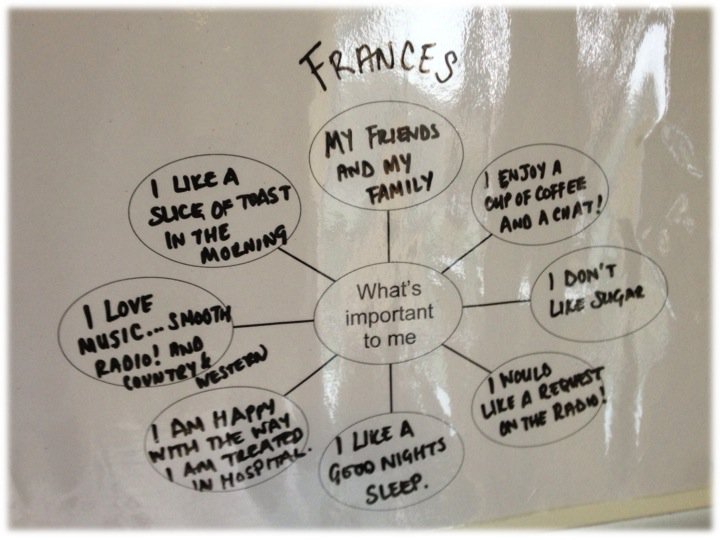 The team at the Langlands Unit in the the South Glasgow University Hospital decided that they needed to get to know the people in their ward better. They had had some stories and feedback from a range of sources that reminded them that it is really important to understand who a person is in the context of their own life, not just as a "patient" in a bed.
The team at the Langlands Unit in the the South Glasgow University Hospital decided that they needed to get to know the people in their ward better. They had had some stories and feedback from a range of sources that reminded them that it is really important to understand who a person is in the context of their own life, not just as a "patient" in a bed.After seeing a great example from a children's service that used a graphic process to find out what really mattered to children, they were inspired to develop something similar for their unit. They used a simple mind map on an A3 sheet as a process to find out the things that were really important to the people in their ward. They started small and tested the process to try it out and get it fit for purpose.
Initially Activities Coordinators completed the poster often with the family supporting too. With consent the posters are displayed on the whiteboard above the person's bed which served as a reminder of the importance of these things, as well as being a prompt for anyone supporting the person to personalise their interaction.
As time went on more members of the team recognised the value of the process and the information it provided and joined in. And so it spread throughout the ward and then on to other neighbouring wards in the unit.
Just one example of the impact this great intervention had can been seen in the story of an older lady with advanced dementia. She had been admitted to the ward but was increasingly agitated and kept trying to move around unsupported and had fallen. The team brought in a member of staff to provide 1:1 care to prevent this happening. Soon after admission, with the family in attendance, the team completed a "What's important to you?" poster. During this process the family said that "she always has her rosary beads in her hand". This prompted the staff to find the rosary that had been efficiently tidied away into the locker! They gave her the rosary beads and very quickly she settled down and soon after the 1:1 support was stepped down.
Great example of how good person-centred care facilitated safe, effective care.

